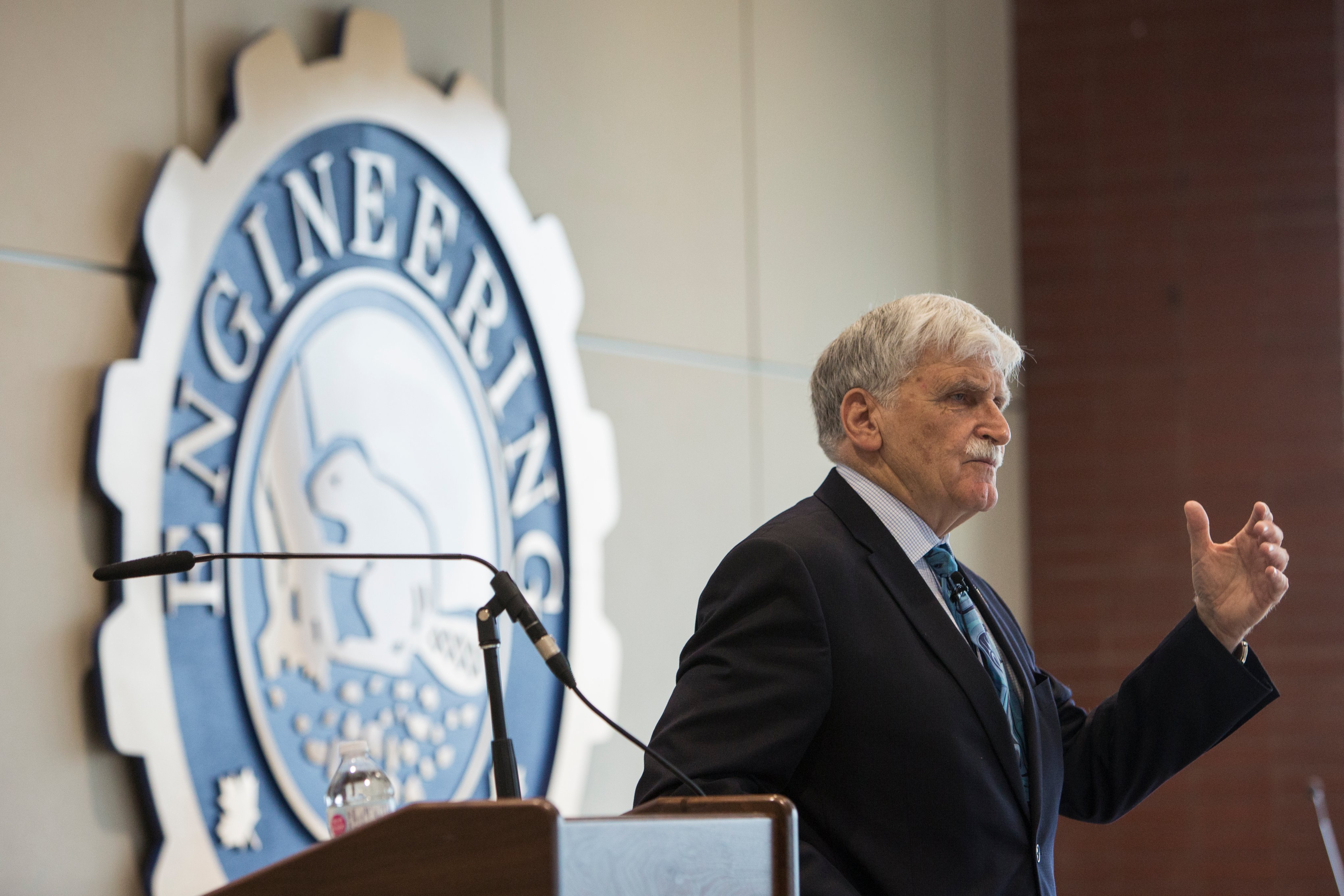
The Honourable Lieutenant-General Romeo Dallaire (Ret.) addressed engineering students and faculty members and university leaders, focusing on the job of developing ethical leaders. Photo: Amber Bracken
(Edmonton) The next generation of Canadian engineers needs to be educated in what it means to be humanly engaged, ethically and morally based leaders.
"What's the aim of all our efforts, of our duties, of our profession, and of our responsibility within it?" This question was posed by the Honourable Lieutenant-General Romeo Dallaire (Ret.) when he spoke at the Faculty of Engineering's Stanford Lecture on Wednesday as the first speaker in the Aspects speaker series.
Drawing from experience leading a UN mission through unimaginable horrors of the genocide in Rwanda in 1994, Dallaire shared his knowledge of responding ethically, responding according to our fundamental beliefs, and aligning our decisions with our moral references.
"You have enormous responsibilities in your profession," Dallaire said to engineering alumni, students, and university leaders.
"But we have a requirement to prepare the people to handle those ethical, moral, and legal dilemmas and face the very complex and ambiguous scenarios that will continuously be thrown at us. Unless you build that depth," Dallaire added, "you're building a bunch of technicians."
He says that although engineers are responsible for building infrastructure and meeting the demands of society, "the society is made up of people, and the people have got to be treated as humanly as possible."
Dallaire related the story of Canadian soldiers under his command who rushed to provide comfort to victims of a brutal, deadly attack before being ordered to help. He asked the audience what makes people demonstrate heroic compassion in the face of the horrors of war.
"What made them do that? To take that risk?"
He says the young soldiers in Rwanda simply could not abandon people in need, because of who they are: because of their ethics, their morals; all formed by family, friends, and by the culture of the nation.
Just as his men would not abandon people in need, Dallaire refused to relinquish command over the final 450 UN Peacekeepers so that they could be evacuated from Rwanda. He would not leave the people of Rwanda to their fate without doing everything he could to help them. He refused a direct order and became a rogue commander-a decision based on his desire to lead ethically and to respond to his fundamental beliefs and moral references.
This powerful lesson demonstrates that human leadership requires the leader not always do what's best for the organization politically, financially, or psychologically. Human leadership requires that risks be taken if one is to lead based on ethics, morals, and humanity.
Engineering Associate Dean of Outreach Ania Ulrich says graduating engineers will be technically competent, but real success will come from bringing out that human element, from training students in emotional and social competence.
"That's what will set our graduates apart-we will train them to become leaders." Ulrich said, adding that teaching students compassion is key to their success, so that they will be able to instinctively make ethical and moral decisions when required.
Compassionate, ethical leadership drives the Faculty of Engineering, with initiatives such as the Engineering with Decency research program that seeks to find innovative ways to provide clean drinking water to Indigenous communities in Alberta, first by building a connection to the people they serve, to the community, and to their humanity. Another initiative is the national Engage North program. First established in the Faculty of Engineering, this national program places students in Indigenous and remote communities where they will become immersed in the humanity of the people while providing any services that they need.
These initiatives do not bring profit to the university. They do not make the Faculty of Engineering more prestigious. These initiatives give engineering students the opportunity to build the moral references that will allow them to lead with compassion and humanity.
As Dallaire says, the next generation needs to be grounded and considerate.
"It's not a lecture within a program, but an actual full course, a full construct, or an atmosphere that your departments or faculty establishes as an ethical, moral reference that people should live by," he said, "what we need is humanly engaged, ethically and morally correct leaders. That is your mission."